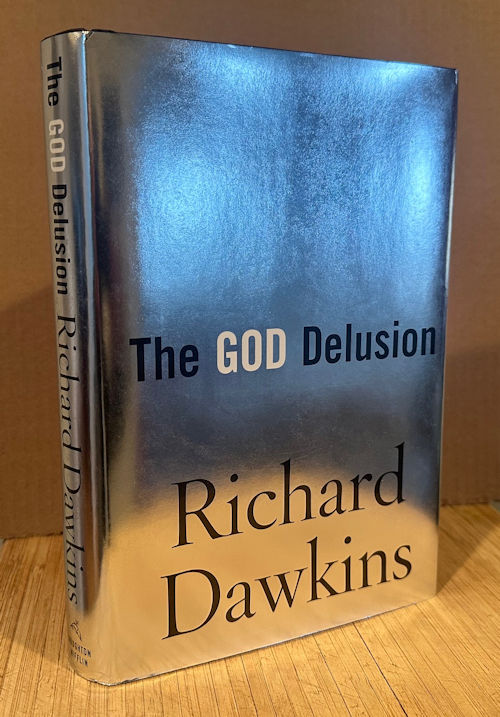(Houghton Mifflin, Oct. 2006, 406pp, including 26pp of appendix, books cited, notes, and index)
Our chapter today is about morality, and where it comes from if not religion. We could begin with my standard arguments. If you think morality is derived from religion, does that mean you wouldn’t know right from wrong without consulting a list of rules in your holy book? Do you people who don’t follow your religion are immoral, or amoral? Most, given a moment’s thought, would say no to both. There is something about morality that seems innate, intuitive. In fact, from current understanding, morality is in fact part of evolved human nature, and is reflected, second-hand, in the various religious texts. Dawkins alludes to a number of other writers who’ve explored this theme; I’ve gathered a few others over the years since Dawkins published.
*
Ch 6, The Roots of Morality: Why Are We Good?
It’s often thought religion must be the basis for morality, and some of the rage over non-moral issues, e.g. evolution, comes from the implication that undermining religion would lead to immorality.
The nastiest reader letters author gets are motivated by religion—examples pp211-213 that consign him to hell, etc., usually ungrammatical and misspelled. Why does God need such defenders? Even some intelligent people, e.g. a medical doctor, is greatly troubled by the supposed nihilism of Darwinism.
P214, Does our moral sense have a Darwinian origin? Several recent books (e.g. Shermer, Hauser) have explored how our moral sense—including compassion for strangers, etc.—can have a Darwinian origin; this section is author’s version. The idea of a ‘selfish gene’ doesn’t contradict this—it means the unit of selection is the gene, not the individual. Genes can ensure their own survival by making individual organisms selfish—or other ways, via kin-selection and reciprocal altruism, both well understood. The latter includes the detection of inevitable cheats. Game theory describes variations. Secondary phenomena include reputation (cf. Ridley Origins of Virtue), and altruism as a demonstration of dominance or superiority. All four kinds of altruism (p219b) would have been favored in the environment of early humans—small villages or roving bands, where most others *were* extended kin to some degree. That these same motives work in modern society among strangers may be a type of ‘misfire’, in the sense that they work despite the absence of their origin rationale. Thus kindness to strangers, or adopting a child. But we can understand natural selection’s ‘purpose’ for sexual desire and still enjoy it. Nor does it diminish romantic love.
P222, A case study in the roots of morality. Marc Hauser’s Moral Minds describes experiments in moral philosophy—describing hypothetical situations to people, typically involving a runaway truck, and asking whether it’s morally justifiable or not to take certain actions. E.g, the truck will run down 5 people, or can be diverted to a sideroad and run down 1 person. Justifiable? What if you can push a fat man off the bridge to stop the truck? Most say yes to the first, no to the second. And so on. To the point, there’s no difference in responses between those who are religious and those who aren’t. [[ This is the now famous trolley problem. I have Hauser’s book but have not yet read it. ]]
P226, If there is no god, why be good? Author’s response is, are you only good because you believe God is watching over your shoulder and peering into your mind? Because you fear punishment? Otherwise you would rape and steal and lie? (cf. the Shermer book) If people claim they would be good anyway, they undermine their claim that God is necessary to be good. Dostoevsky, in Brothers Karamazov, apparently believed people would *not* be good—and Steven Pinker’s experience (cf. Blank Slate) with mayhem during a police strike supports that belief (though apparently fear of God didn’t keep them in order). Author suspects criminals are more likely to be religious; that more educated people are less likely. Sam Harris (in Letters) cites statistics about which states and cities are the safest—those in the religious south are least so. And if there were correlation between religious faith and moral behavior, surely religious advocates would have discovered it by now (cf Dennett).
Still, how does one decide what is good and what isn’t, without religion? Kant tried to derive morals from non-religious sources—e.g. his categorical imperative: act only on such principles that would work as universal rules. This works for some rules, e.g. lying, not so well for other issues. Moral philosophers can be categorized as ‘derontologists’—belief in absolute rules—and ‘consequentialists’—where morality of an action depends on its consequences. The only rival for absolutism to religion might be patriotism.
In any event, people who claim morals derive from holy books don’t usually follow those books… and a good thing, too.
\\
My comments: People are good because it’s advantageous for them to be good… One gets along better in the world when does not lie or cheat or murder, when one is rather cooperative and altruistic. In the sense that success in life is all about passing your genes on to the next generation, these traits against being ‘bad’ and for being ‘good’ enable the bearer to pass their genes on more successfully than someone who is ‘bad’ and is constrained by others from doing so.






